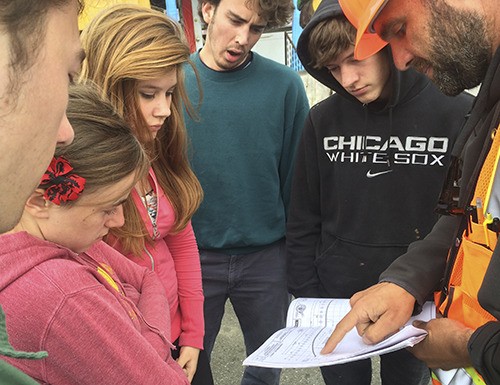The fate of the North Olympic Peninsula Skills Center’s Natural Resources program is to be discussed today, Wednesday, May 6.
Following a contentious meeting April 28 where about 50 people attended to listen and provide public comment regarding whether the skills center should continue to offer its Natural Resources program, the center’s Administrative Council plans to revisit the topic.
Many supporters of the program gave public comments and asked the council to rethink cutting the program.
“For me, the influence of the group caused the council to pause and check our facts.” Sequim School District Superintendent Kelly Shea said. Since 2008, the Natural Resources program has given students from Sequim, Port Angeles, Forks and LaPush “opportunities to define themselves from a young age as engaged, productive citizens,” Daniel Lieberman, Natural Resources program teacher, told the Gazette in a past interview.
The program is one of three skills center satellite programs within the Sequim School District.
“Through the Natural Resources classes, students earn credit and obtain skills, schools gain additional options that fit diverse learners and community organizations connect with and train potential future employees as these youth participate in environmental projects,” he said.
Although the Skills Center’s Administrative Council composed of superintendents from Quillayute Valley, Cape Flattery, Crescent, Port Angeles and Sequim districts recognize the value of the program, Diana Reaume, Quillayute Valley School District superintendent and council chairman explained the council has been mulling over the discontinuation of the program since October.
“All the council members agree it’s (the program) a good thing for the students and the community,” Shea said.
However, regardless of the shared support of program, the financial viability and whether it’s consistent with Washington’s Office of Superintendent of Public Instruction is in question, Reaume explained.
The program is structured as a “Alternative Learning Experience” given much of the students’ time is spent outside the traditional classroom setting; thus despite being a state-approved Career and Technical Education (CTE) class, it doesn’t qualify for CTE-approved funding.
Because of the funding formula for Alternative Learning Experience CTE classes, it brings in less money than non-Alternative Learning Experience CTE classes, Lieberman said, but argues “the slightly reduced ALE funding rate is compensated by the program having more students enrolled.”
To better understand the financial and legal standing of the program, Reaume said the council left the April 28 meeting with four points needing clarified before making a decision.
“We want to make sure we’re all on the same page about where the information we’re getting,” she said.
In preparation for today’s (May 6) meeting, council members have been gathering information on the following points: the program’s student enrollment and finances, whether Alternative Learning Experience classes are allowed through the skills center, whether an Alternative Learning Experience class can be considered a Career and Technical Education class and whether the instructor of a Career and Technical Education class needs to be highly qualified for students to get credit recovery for English and science via the program.
Having attended the April 28 meeting, Jeff Ward, Natural Resources advisory board member and retired Pacific Northwest National Laboratory scientist, noted the “uncertainty” among the council regarding the program’s financial and technical status.
Throughout his years on the program’s advisory board, Ward said he’s watched Lieberman build the program from very little and reach out to students and provide them with an alternative when they’re close to walking away from their education.
“The hope is the administration can figure out how to keep the program,” Ward said. “Once these relationships and programs are gone, it’s really hard to get them back.”



